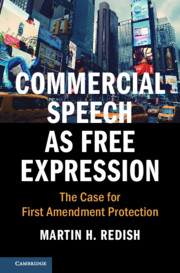Book contents
- Commercial Speech as Free Expression
- Cambridge Studies on Civil Rights and Civil Liberties
- Commercial Speech as Free Expression
- Copyright page
- Dedication
- Contents
- Preface
- Acknowledgments
- 1 Commercial Speech and the Values of Free Expression
- 2 False Commercial Speech and the First Amendment
- 3 The Right of Publicity, Commercial Speech, and the Equivalency Principle
- 4 Compelled Commercial Speech and the First Amendment
- 5 Scientific Expression and Commercial Speech
- Conclusion
- Index
3 - The Right of Publicity, Commercial Speech, and the Equivalency Principle
Published online by Cambridge University Press: 21 May 2021
- Commercial Speech as Free Expression
- Cambridge Studies on Civil Rights and Civil Liberties
- Commercial Speech as Free Expression
- Copyright page
- Dedication
- Contents
- Preface
- Acknowledgments
- 1 Commercial Speech and the Values of Free Expression
- 2 False Commercial Speech and the First Amendment
- 3 The Right of Publicity, Commercial Speech, and the Equivalency Principle
- 4 Compelled Commercial Speech and the First Amendment
- 5 Scientific Expression and Commercial Speech
- Conclusion
- Index
Summary
Usually, free speech issues arise in the context of governmental suppression of expression. However, the Supreme Court has long recognized that the values fostered by the free expression guarantee may be equally undermined by the compulsion of expression. While certain exceptions exist, it is well established constitutional doctrine that in the context of noncommercial speech, compelled expression is for the most part unconstitutional. The situation is far more confused, however, in the context of compelled commercial speech. Several decisions of the Court have sent frustratingly mixed signals on the subject, leaving the area woefully uncertain. This chapter argues that the equivalency principle, which this book argues throughout should apply to measure the constitutionality of the suppression of commercial speech, applies with just as much force to compelled commercial expression. The chapter reaches this conclusion by applying the four-perspective framework developed in Chapter 1. But as is the case in other applications of the equivalency principle, it does not necessarily follow that compelled commercial speech will be invalidated in every instance in which comparable noncommercial speech would be invalidated. To be sure, he First Amendment value of the two forms of speech must be deemed identical. But by their very nature, certain forms of commercial speech give rise to a far greater degree of confusion or harm, and as a result in these relatively narrow circumstances, compelled commercial speech will be constitutionally appropriate where comparable compelled noncommercial speech will not. The categorical reach of these exceptions is determined by application of the taxonomy of harms, developed first in Chapter 2.
Keywords
- Type
- Chapter
- Information
- Commercial Speech as Free ExpressionThe Case for First Amendment Protection, pp. 60 - 102Publisher: Cambridge University PressPrint publication year: 2021

